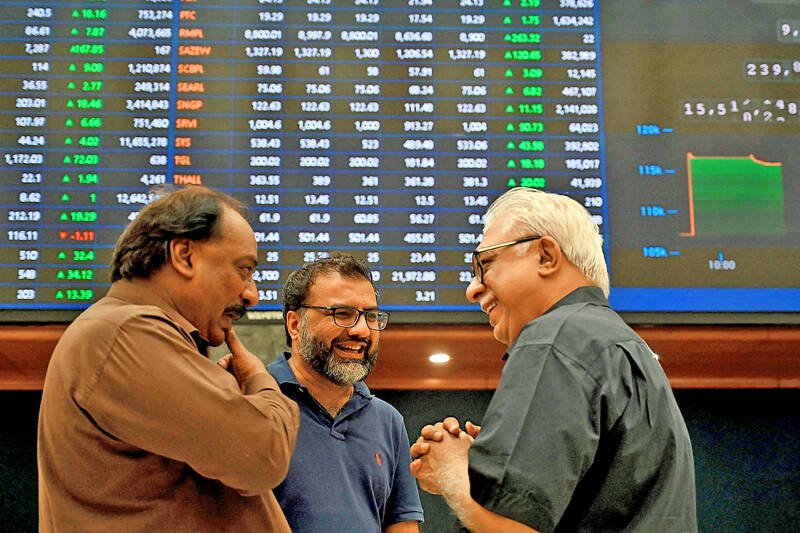World shares and US futures surged yesterday after the US and China announced they were suspending for 90 days most of the sharp tariff hikes each has imposed since US President Donald Trump began escalating his trade war.
For a 90-day period, the US is to cut tariffs on Chinese goods to 30 percent from as high as 145 percent, while China’s tariffs on US goods would fall to 10 percent from 125 percent, a joint statement said.
The agreement to allow time for more talks followed weekend negotiations in Geneva, Switzerland, that the US side said had made “substantial progress.”

Photo: AFP
The full impact on the tariffs and other trade penalties enacted by Washington and Beijing remains unclear, and much depends on whether they find ways to bridge differences during the suspension.
However, as trade envoys from the world’s two biggest economies blinked, finding ways to pull back from potentially massive disruptions to world trade and their own markets, investors rejoiced.
The TAIEX ended up 214.50 points, or 1.03 percent, at 21,129.54, on the back of improved market sentiment toward the US-China trade talks. Buying also focused on the bellwether electronics sector, with investors anticipating positive leads from the Computex trade show in Taipei, which is to run from Tuesday next week to Friday.
“Computex is coming,” Hua Nan Securities Investment Management Co (華南投顧) analyst Kevin Su (蘇俊宏) said. “Investors hope [artificial intelligence] chip designer Nvidia Corp CEO Jensen Huang (黃仁勳) will give positive leads in his speech at the event.”
Regional equities also climbed, with Hong Kong jumping 3 percent, while Shanghai — which closed before the tariff cuts were announced — was up 0.8 percent.
Tokyo, Sydney, Seoul and Wellington were all in the green. Paris and Frankfurt rose more than one percent, while London was also higher in early European trading.
Oil prices rallied, with US benchmark crude oil gaining US$1.66 to US$62.68 per barrel. Brent crude, the international standard, added US$1.63 to US$65.55 per barrel.
The US dollar surged against the yen, trading at 148.18 yen, up from 146.17. The euro fell to US$1.1107 from US$1.1209.
“The initial reaction to the weekend US-China talks [is] predictably encouraging,” Pepperstone Group research head Chris Weston said.
However, Bank J Safra Sarasin chief economist Karsten Junius was cautious.
“We expect financial markets to remain volatile over the coming months, as they have almost fully priced out negative economic surprises and could once again be disrupted by more serious obstacles in trade negotiations,” he said in a commentary. “In all likelihood, things may still get worse before they get better.”
Investors were also watching for developments in other flashpoints, including clashes between India and Pakistan.
The Sensex in Mumbai shot up 3.2 percent after India and Pakistan agreed to a truce after talks to defuse their most serious military confrontation in decades. Pakistan’s KSE 100 surged more than 9 percent.
Additional reporting by CNA and AFP

SEMICONDUCTOR SERVICES: A company executive said that Taiwanese firms must think about how to participate in global supply chains and lift their competitiveness Taiwan Semiconductor Manufacturing Co (TSMC, 台積電) yesterday said it expects to launch its first multifunctional service center in Pingtung County in the middle of 2027, in a bid to foster a resilient high-tech facility construction ecosystem. TSMC broached the idea of creating a center two or three years ago when it started building new manufacturing capacity in the US and Japan, the company said. The center, dubbed an “ecosystem park,” would assist local manufacturing facility construction partners to upgrade their capabilities and secure more deals from other global chipmakers such as Intel Corp, Micron Technology Inc and Infineon Technologies AG, TSMC said. It

NO BREAKTHROUGH? More substantial ‘deliverables,’ such as tariff reductions, would likely be saved for a meeting between Trump and Xi later this year, a trade expert said China launched two probes targeting the US semiconductor sector on Saturday ahead of talks between the two nations in Spain this week on trade, national security and the ownership of social media platform TikTok. China’s Ministry of Commerce announced an anti-dumping investigation into certain analog integrated circuits (ICs) imported from the US. The investigation is to target some commodity interface ICs and gate driver ICs, which are commonly made by US companies such as Texas Instruments Inc and ON Semiconductor Corp. The ministry also announced an anti-discrimination probe into US measures against China’s chip sector. US measures such as export curbs and tariffs

The US on Friday penalized two Chinese firms that acquired US chipmaking equipment for China’s top chipmaker, Semiconductor Manufacturing International Corp (SMIC, 中芯國際), including them among 32 entities that were added to the US Department of Commerce’s restricted trade list, a US government posting showed. Twenty-three of the 32 are in China. GMC Semiconductor Technology (Wuxi) Co (吉姆西半導體科技) and Jicun Semiconductor Technology (Shanghai) Co (吉存半導體科技) were placed on the list, formally known as the Entity List, for acquiring equipment for SMIC Northern Integrated Circuit Manufacturing (Beijing) Corp (中芯北方積體電路) and Semiconductor Manufacturing International (Beijing) Corp (中芯北京), the US Federal Register posting said. The

India’s ban of online money-based games could drive addicts to unregulated apps and offshore platforms that pose new financial and social risks, fantasy-sports gaming experts say. Indian Prime Minister Narendra Modi’s government banned real-money online games late last month, citing financial losses and addiction, leading to a shutdown of many apps offering paid fantasy cricket, rummy and poker games. “Many will move to offshore platforms, because of the addictive nature — they will find alternate means to get that dopamine hit,” said Viren Hemrajani, a Mumbai-based fantasy cricket analyst. “It [also] leads to fraud and scams, because everything is now